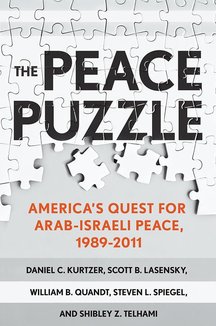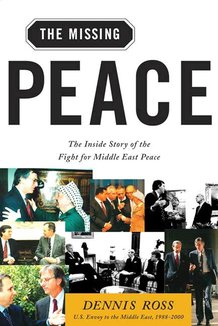Recommended Books

The Peace Puzzle: America's Quest for Arab-Israeli Peace, 1989–2011
Authors:
Daniel C. Kurtzer
,
Scott B. Lasensky
,
William B. Quandt
,
Steven L. Spiegel
,
Shibley Telhami
ISBN 13:
978-0801451478
Each phase of Arab-Israeli peacemaking has been inordinately difficult in its own right, and every critical juncture and decision point in the long process has been shaped by U.S. politics and the U.S. leaders of the moment. The Peace Puzzle tracks the American determination to articulate policy, develop strategy and tactics, and see through negotiations to agreements on an issue that has been of singular importance to U.S. interests for more than forty years. In 2006, the authors of The Peace Puzzle formed the Study Group on Arab-Israeli Peacemaking, a project supported by the United States Institute of Peace, to develop a set of "best practices" for American diplomacy. The Study Group conducted in-depth interviews with more than 120 policymakers, diplomats, academics, and civil society figures and developed performance assessments of the various U.S. administrations of the post–Cold War period. This book, an objective account of the role of the United States in attempting to achieve a lasting Arab–Israeli peace, is informed by the authors’ access to key individuals and official archives.
Find on:
 Amazon
Amazon

Arabs and Israelis: Conflict and peacemaking in the Middle East
Authors:
Abdel Monem Said Aly
,
Shai Feldman
,
Khalil Shikaki
ISBN 13:
978-1350321380
Lasting over 120 years, the Arab-Israeli conflict involves divergent narratives about history, national identities, land ownership, injustices and victimhood. Domestic forces and actors as well as international and regional dynamics have ensured the conflict's durability. A distinguished team of authors comprising an Israeli, a Palestinian and an Egyptian present a broader Arab perspective in this innovative textbook that offers a balanced and nuanced introduction to a highly contentious subject. Providing an overview of key developments in the history of the conflict, it explores attempts at resolution, before going on to portray the perspectives of the important parties. It places the events of the conflict within a regional and international context, providing an invaluable insight into the opposing narratives behind the conflict. The much-anticipated second edition of Arabs and Israelis includes: - Up-to-date coverage of key developments since the Arab Awakening, including the shifting pattern in relations from Obama to Trump, the Abraham Accords, the fall of Netanyahu and the resurgence of the war in early 2021. - Brand new 'Key Developments', 'Key Documents' and 'Key Figures' feature boxes to help students zoom in on landmark events, policies and actors throughout history. - Detailed full colour maps, timelines and photos to visually complement the text. - A rich companion website including interactive timelines and maps, discussion questions, chapter summaries and more. A comprehensive and engaging account of the Arab-Israeli conflict, it is the ideal companion for students at undergraduate and postgraduate level taking History, Politics and Middle Eastern Studies degrees.

The Missing Peace: The Inside Story of the Fight for Middle East Peace
Author:
Dennis Ross
ISBN 13:
978-0374529802
"The definitive and gripping account of the sometimes exhilarating, often tortured twists and turns in the Middle East peace process, viewed from the front row by one of its major players."--Bill Clinton The Missing Peace , published to great acclaim last year, is the most candid inside account of the Middle East peace process ever written. Dennis Ross, the chief Middle East peace negotiator in the presidential administrations of George H. W. Bush and Bill Clinton, is that rare figure who is respected by all parties: Democrats and Republicans, Palestinians and Israelis, presidents and people on the street in Jerusalem, Ramallah, and Washington, D.C. Ross recounts the peace process in detail from 1988 to the breakdown of talks in early 2001 that prompted the so-called second Intifada-and takes account of recent developments in a new afterword written for this edition. It's all here: Camp David, Oslo, Geneva, Egypt, and other summits; the assassination of Yitzak Rabin; the rise and fall of Benjamin Netanyahu; the very different characters and strategies of Rabin, Yasir Arafat, and Bill Clinton; and the first steps of the Palestinian Authority. For the first time, the backroom negotiations, the dramatic and often secretive nature of the process, and the reasons for its faltering are on display for all to see. The Missing Peace explains, as no other book has, why Middle East peace remains so elusive.